Snoring isn’t just a human problem — dogs do it too. If you’ve ever asked yourself, “why does my dog snore?”, you’re not alone. The truth is, snoring can be perfectly normal for some dogs, but in other cases it signals an issue that deserves attention. Understanding the difference is key to keeping your pup healthy and comfortable.
Why Does My Dog Snore?
Dogs snore when airflow is partially blocked in their nose, throat, or airways. Common causes include breed anatomy (especially flat-faced dogs like Bulldogs and Pugs), sleep position, obesity, allergies, and respiratory infections. Occasional snoring is normal, but loud, chronic, or sudden snoring may signal a health issue that requires a vet’s attention.
Is It Normal for Dogs to Snore?
The short answer: yes, sometimes. Many dogs snore occasionally, especially when they’re deeply relaxed during sleep. Factors like sleeping position, breed anatomy, and age play a big role in whether your dog is prone to sawing logs.
However, chronic, sudden, or extremely loud snoring shouldn’t be ignored. It can signal breathing difficulties, infections, or even sleep apnea. Think of dog snoring as a sliding scale: from normal quirks to warning signs, depending on the context.
Common Causes of Dog Snoring
Dogs snore for a range of reasons — from genetics to lifestyle habits. Here are the most common causes:
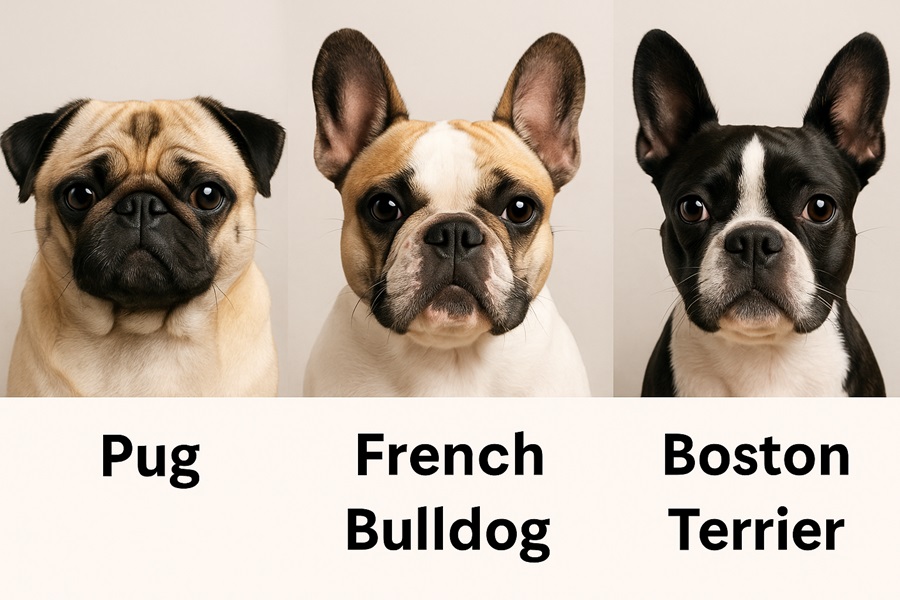
- Breed & Anatomy
Some breeds are simply built to snore. Brachycephalic dogs — those with short snouts and flat faces like Bulldogs, Pugs, and French Bulldogs — are notorious for it.
Their compressed airways, elongated soft palates, and narrow nostrils make airflow more difficult. This condition, often called brachycephalic obstructive airway syndrome (BOAS), means snoring is almost guaranteed.
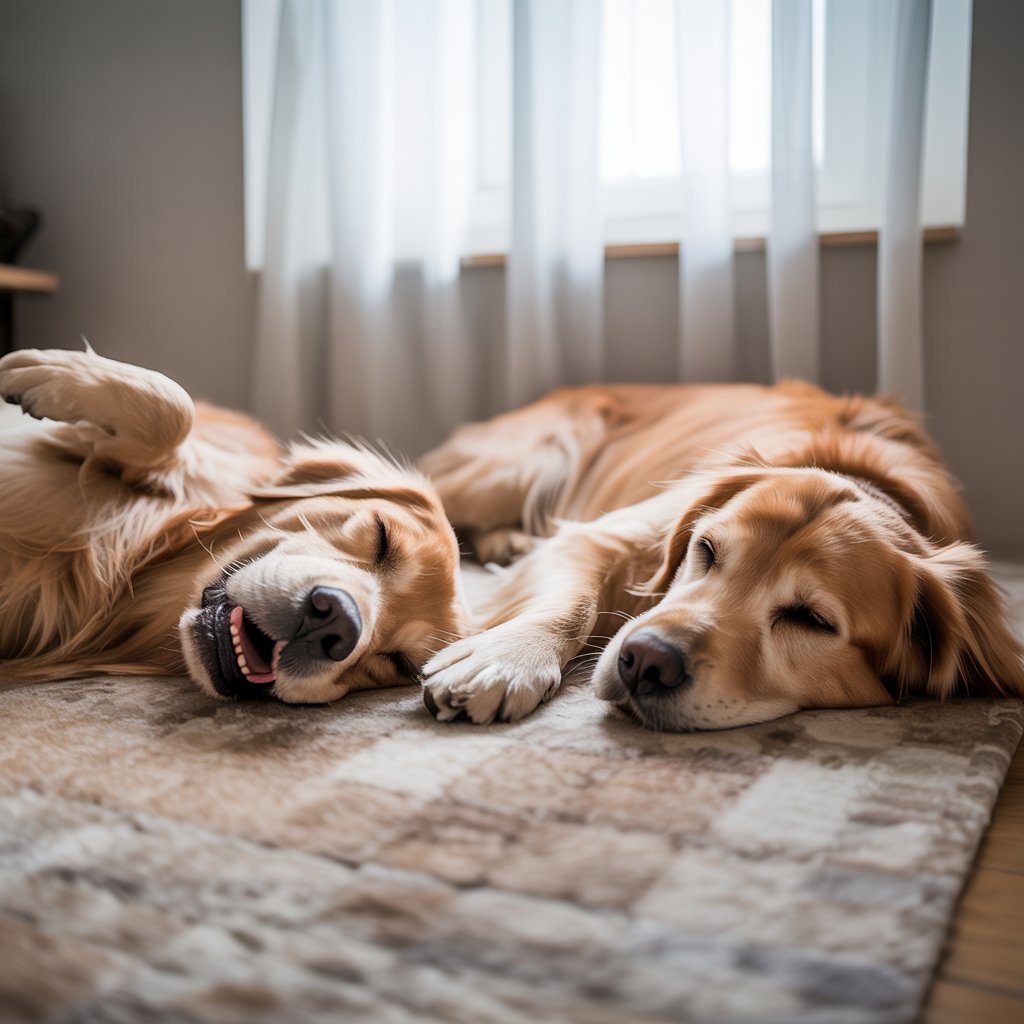
- Sleep Position
Just like humans, dogs that sleep on their backs are more likely to snore. In this position, the tongue and throat tissues relax, partially blocking airflow and creating those rattling noises.
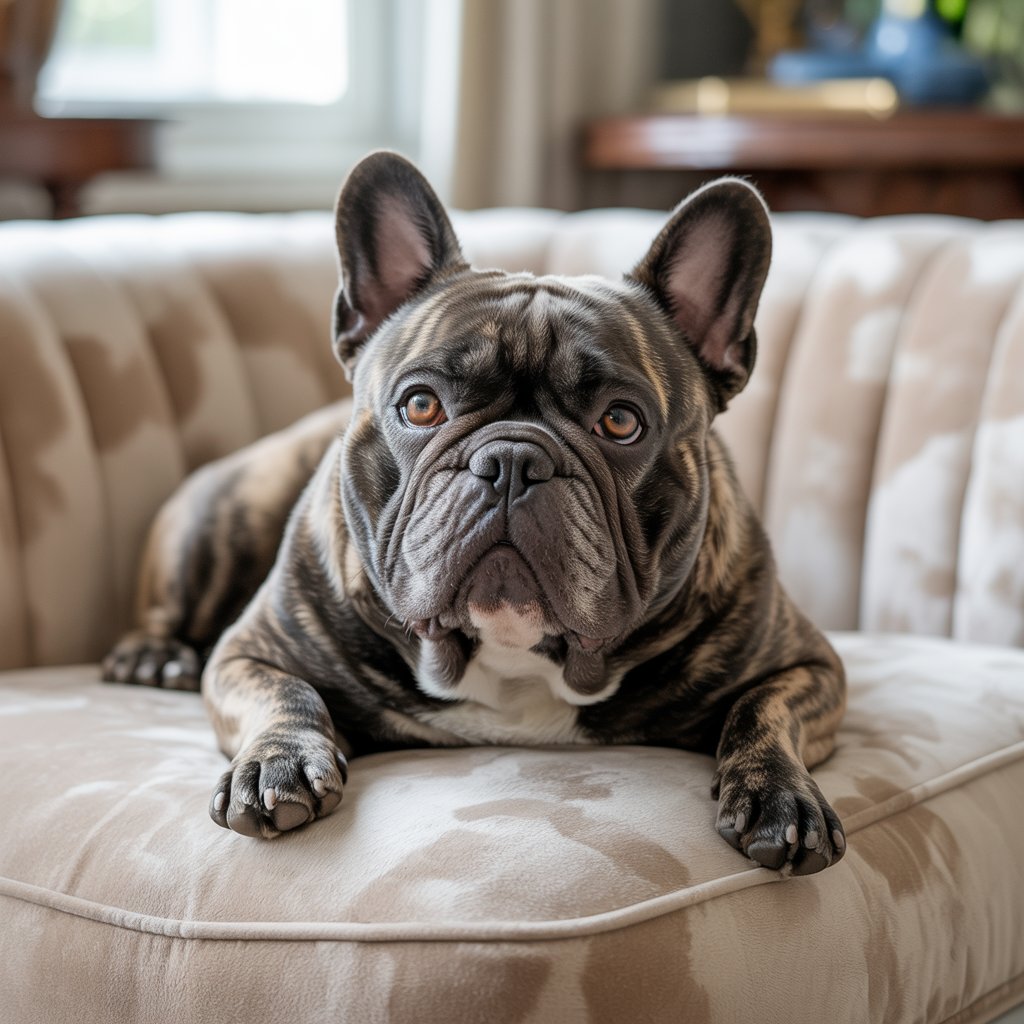
- Weight & Obesity
Excess weight can lead to fat deposits around the throat and chest, narrowing the airways. Overweight dogs often snore more heavily, and their breathing problems can worsen with time. This is one of the most preventable causes of chronic snoring.
- Allergies & Irritants
Environmental factors like dust, pollen, mold, smoke, or even scented candles can irritate your dog’s nasal passages. When inflamed, these tissues cause noisy breathing and snoring, particularly during allergy seasons.
- Respiratory Infections & Health Issues
Snoring may indicate an infection or illness affecting your dog’s breathing. Conditions such as:
- Kennel cough
- Nasal infections
- Chronic bronchitis
- Asthma-like inflammation
These issues often come with other symptoms — coughing, nasal discharge, or wheezing — that signal it’s time for a vet visit.
- Dental & Oral Problems
Oral health issues, such as gum disease, abscesses, or tumors, can obstruct the airway and contribute to snoring. Dogs with poor dental care may also develop chronic inflammation that worsens sleep quality.
- Age Factor
Older dogs tend to snore more as their airway muscles lose tone with age. Puppies are covered in detail later in this article.
Dog Breeds That Snore the Most
While any dog can snore from time to time, certain breeds are especially prone because of their facial structure or body size.
- Brachycephalic (Flat-Faced) Breeds
- Bulldogs (English & French) – Famous for their deep, rumbling snores, often caused by narrow nostrils and elongated soft palates.
- Pugs – Their short muzzles and compact airways make snoring almost inevitable.
- Boston Terriers – Small but mighty snorers, often with noisy breathing even while awake.
- Shih Tzus & Pekingese – Toy breeds with flat faces that make airflow more difficult.
- Large, Heavy-Bodied Breeds
- St. Bernards – Known for drooling, heavy breathing, and thunderous snores.
- Newfoundlands – Large size combined with thick throat tissues contributes to noisy sleep.
- Mastiffs – Their heavy build and relaxed throat muscles make them frequent snorers.
- Other Prone Breeds
- Boxers – Strong, muscular dogs with shorter snouts that often snore loudly.
- Chow Chows – Their thick neck and throat structure can restrict airflow during sleep.
Note: If your dog isn’t on this list but still snores frequently, don’t dismiss it. Snoring can happen in any breed due to weight, allergies, infections, or sleeping habits.
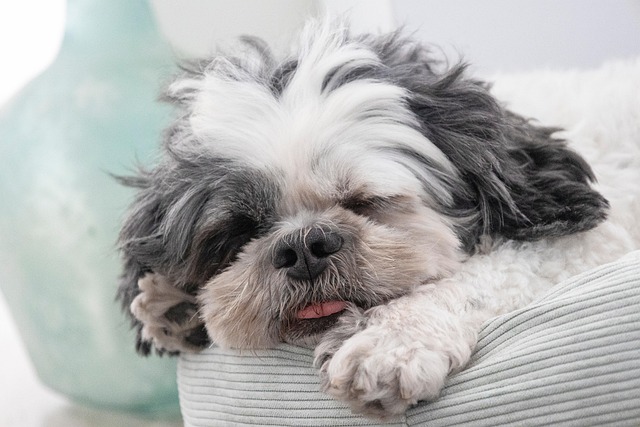
Do Puppies Snore Too?
Yes — puppies can snore just like adult dogs, and in many cases, it’s perfectly normal. Their bodies are still developing, and their airways, muscles, and tissues are more flexible, which can sometimes lead to soft vibrations while they sleep.
Puppies may snore more if they:
- Sleep on their backs, allowing the tongue or soft palate to partially block airflow.
- Have short muzzles, like Pugs or French Bulldogs, where anatomy already makes breathing noisier.
- Are extra tired, since deep, relaxed sleep increases the chance of snoring.
The key difference between puppies and adults is that puppy snoring often improves as they grow. As their airways and muscles mature, many young dogs naturally outgrow frequent snoring.
However, if your puppy’s snoring is loud, constant, or accompanied by coughing, nasal discharge, or labored breathing, it’s worth consulting your veterinarian. Occasional snores are fine, but any ongoing noisy breathing deserves a vet check.
Bottom line: occasional puppy snores are usually nothing to worry about — but just like with adult dogs, sudden changes or ongoing noisy sleep deserve a closer look.
Why Does My Dog Snore at Night?
It’s common for pet parents to notice their dog snoring mainly at night. During the day, dogs often nap lightly, but at night they slip into deeper sleep cycles, which makes snoring more likely. Just like humans, when dogs enter REM (dream) sleep, their muscles relax, including the throat and tongue, which can partially block airflow and create that familiar rumble.
Several factors can make nighttime snoring worse:
- Sleeping position – Dogs that roll onto their backs at night may snore more because relaxed throat tissues can block airflow.
- Room environment – Bedrooms tend to be warmer or less ventilated than other parts of the home. Dry air, fans, or heating systems can irritate airways, increasing snoring.
- Deeper relaxation at night – Dogs are usually more active during the day, so their naps are shorter and lighter. At night, when they finally relax, tissues around the airway loosen more, leading to louder snores.
- Owner’s awareness – You’re less likely to notice snoring during the day because you’re busy. At night, in the quiet, every sound seems louder.
Most of the time, night-only snoring is harmless, especially if your dog is otherwise healthy. But if the snoring seems unusual or linked to breathing problems, get it evaluated.
Takeaway: Nighttime snoring is usually a result of deeper sleep, sleep position, or bedroom environment — but persistent, loud changes should never be ignored.
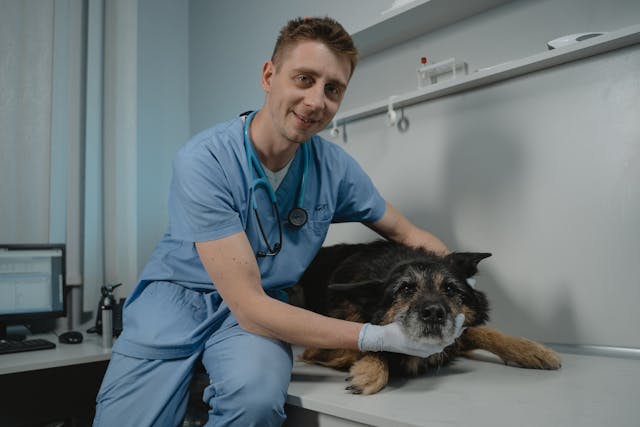
When Snoring Is a Red Flag
While some snoring is harmless, certain signs mean you should take action. Contact your vet if your dog’s snoring is accompanied by:
- Sudden onset of loud snoring in a previously quiet sleeper.
- Difficulty breathing while awake.
- Snoring plus other symptoms, such as coughing, wheezing, nasal discharge, or lethargy.
- Pauses in breathing or gasping (possible canine sleep apnea).
- Behavioral changes, like reduced energy or reluctance to exercise.
Remember: If your dog seems uncomfortable or struggles to breathe, don’t wait — veterinary care is essential.
Normal vs. Concerning Dog Snoring
| Normal Snoring | Concerning Snoring |
| Soft or occasional snoring during deep sleep | Sudden onset of loud, harsh snoring in a dog that usually sleeps quietly |
| More common in flat-faced breeds (Pugs, Bulldogs, Frenchies) | Pauses in breathing, choking, or gasping (possible sleep apnea) |
| Happens when sleeping on the back or in very relaxed positions | Snoring accompanied by coughing, wheezing, or nasal discharge |
| Increases slightly with age as throat muscles relax | Persistent snoring that doesn’t improve with position changes |
| May get louder after a long, tiring day of activity | Snoring linked to behavioral changes like fatigue, restlessness, or reluctance to exercise |
Quick Tip: Occasional light snoring is usually nothing to worry about, but if your dog’s snoring is loud, chronic, or paired with breathing problems, a vet check is the safest choice.
How to Help Your Dog Stop Snoring (Home Solutions)
The good news? Many cases of dog snoring can be improved with simple lifestyle adjustments. Here are proven strategies:
1. Improve Sleeping Position
Encourage your dog to sleep on their side instead of their back. Orthopedic dog beds with bolsters can naturally keep them in healthier positions.
2. Manage Weight
Help your dog maintain a healthy weight with proper diet and exercise. Shedding extra pounds often reduces or eliminates snoring entirely.
3. Optimize Air Quality
- Use an air purifier to reduce dust, pollen, and dander.
- Avoid smoking near your dog.
- Keep sleeping areas clean and well-ventilated.
4. Address Allergies
- Wash bedding frequently.
- Vacuum carpets and upholstery to reduce dust.
- Consider hypoallergenic diets if food allergies are suspected.
5. Routine Veterinary Checkups
Regular vet visits ensure that dental issues, respiratory concerns, and weight problems are caught early. Prevention is always easier than treatment.
Veterinary Treatments & Medical Solutions
Sometimes, home remedies aren’t enough. Depending on the diagnosis, a vet may recommend:
- Medications: Anti-inflammatories, antibiotics, or allergy treatments.
- Dental Care: Professional cleaning, extractions, or treatment for gum disease.
- Surgery: In severe BOAS cases, surgical correction of narrowed nostrils or elongated soft palate may be necessary.
⚠️ Important: Never attempt to give human medications to your dog without veterinary guidance. What’s safe for people can be dangerous for pets.
Dog Snoring: Myths vs. Facts
When it comes to dog snoring, there’s plenty of misinformation floating around. Let’s clear up some of the most common myths so you know what’s normal — and what isn’t.
- Myth 1: All snoring dogs are unhealthy.
Fact: Not true. Many dogs, especially flat-faced breeds like Bulldogs and Pugs, snore simply because of their anatomy. Occasional light snoring can be perfectly normal. - Myth 2: Dog snoring is always harmless.
Fact: While some snoring is normal, chronic, loud, or sudden snoring may point to issues like obesity, allergies, or airway problems. Persistent noisy breathing should never be ignored. - Myth 3: Only old dogs snore.
Fact: Dogs of any age can snore. Puppies may snore due to developing airways, while adult dogs may snore from position, weight, or health conditions. Seniors do tend to snore more as their muscles relax with age, but they aren’t the only ones. - Myth 4: Changing a dog’s sleeping position won’t make a difference.
Fact: It often does. Dogs lying on their backs snore more because the tongue and soft palate block airflow. Encouraging side sleeping or providing supportive bedding can reduce nighttime noise. - Myth 5: If my dog snores, it must be sleep apnea.
Fact: Not necessarily. While dogs can develop sleep apnea (especially brachycephalic breeds and overweight dogs), most snoring has less serious causes. A vet can determine if apnea is the culprit.
Takeaway: Snoring can be normal, but it’s not something to dismiss outright. Knowing the difference between harmless myths and medical facts helps you make the best choices for your dog’s health.
FAQs About Dog Snoring
- Why does my dog only snore at night?
Nighttime snoring usually happens when dogs are deeply relaxed. Sleeping on their back or in a warm, stuffy room makes it worse. - Can dogs have sleep apnea?
Yes. It’s more common in brachycephalic breeds and overweight dogs. Symptoms include pauses in breathing, choking, or gasping during sleep. - Do puppies outgrow snoring?
Sometimes. Puppies may snore due to small airways that expand as they grow, but persistent loud snoring should be checked. - Is snoring more common in male or female dogs?
There’s no major gender difference, though males with broader heads and necks may be slightly more prone. - Can stress or anxiety make dogs snore?
Indirectly. Stress can cause shallow breathing or tense muscles, but true snoring is usually anatomical or health-related.
Preventing Future Snoring Issues
You may not eliminate dog snoring completely (especially with flat-faced breeds), but you can minimize it with proactive care:
- Keep your dog at a healthy weight.
- Provide clean air and allergen-free spaces.
- Invest in a supportive bed to encourage better sleeping positions.
- Stay consistent with dental hygiene.
- Monitor any changes in snoring habits — new or worsening symptoms should never be ignored.
Conclusion
So, why does my dog snore? The answer could be as simple as their sleep position — or as complex as a respiratory condition. Occasional, soft snoring is usually harmless, especially in brachycephalic breeds. But persistent, loud, or sudden changes in snoring deserve a closer look.
By paying attention to your dog’s habits, maintaining a healthy lifestyle, and knowing when to seek veterinary advice, you’ll ensure your pup gets the restful sleep they deserve. After all, a good night’s sleep benefits not just your dog — but you, too.


